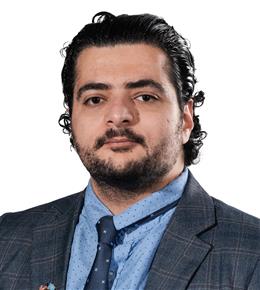Specialty
Quantum Computing
Cybersecurity

Contact Us
Dr. Rodrigue Rizk is currently a professor at the University of South Dakota. Dr. Rizk received the B.E. degree in computer and communication engineering Summa Cum Laude highest honor distinction from Notre Dame University and was the valedictorian of his class with a GPA of 4.0/4.0. He received his M.S. and Ph.D. degrees in Computer Engineering from the University of Louisiana at Lafayette while maintaining a perfect grade point average. His area of specialization is comprised of the dynamic relationship between software and hardware. His research interests include high-level computational systems, artificial intelligence, data science and analytics, Internet of Medical Things (IoMT), data privacy and security, reinforcement learning, quantum and neuromorphic computing, high-performance computer architecture, deep learning optimization, hardware-software co-design, heterogeneous computing, Field Programmable Gate Arrays (FPGA), VLSI, AI hardware accelerators, healthcare, cybersecurity, epigraphy, ancient languages, and emerging technologies. Dr. Rizk has collaborated actively with researchers in several other disciplines of informatics, computer science, and engineering, ranging from theory to design to implementation, and has published several research papers in top-tier conferences and journals. As a researcher and advocate for innovation, he is constantly seeking new ways to apply cutting-edge technologies to solve real-world problems and improve the lives of people.
Over the past years, Dr. Rizk has spent significant effort in serving the research community. He has served as a reviewer for top-tier conferences and journals, including the Hawaii International Conference on System Sciences (HICSS), IEEE Green Technologies Conference (GreenTech), IEEE International Systems Conference (SysCon), IEEE World Congress on Computational Intelligence (WCCI), and the Journal of Computational and Mathematical Organization Theory (CMOT, Springer Nature).
Dr. Rizk is a licensed Professional Engineer with a wide range of industry expertise and a member of the Order of the Engineer in the United States. He is the recipient of the prestigious Richard G. and Mary B. Neiheisel endowed fellowship, a lifetime member of the Phi Kappa Phi honor society, and a professional member of ACM and IEEE. He is also a member of the IEEE Standards Association, IEEE Computer and Quantum Society, ACM-W, and Emerging Interest Groups (EIG) on Smart Connected Communities and Reproducibility and Independent Verification. Dr. Rizk is also the recipient of many prestigious awards including the President's Award for Educational Excellence and Outstanding Academic Achievement and the Ragin’ Leadership Academy Award.
In addition to his work in technology, Dr. Rizk has a deep interest in ancient languages and civilizations. He is a scholar of history and culture. He has made significant contributions to the field through his research and writing, as he explores the intersections between technology and human experience.
Outside the academic life, Dr. Rizk's community service efforts are distinctive and extensive. He serves as a volunteer with a number of state and non-profit organizations and was named a Goodwill Ambassador. He has traveled extensively, working with organizations and communities to promote education, technology, digital disruption, and sustainable development. Dr. Rizk is also a writer, poet, and communicator. He has numerous publications on a variety of topics, including poetry, ancient languages, epigraphy, and emerging technologies. Through his writing, he seeks to inform and inspire a wider audience, and to bring attention to important issues and challenges facing the humanity.
High-level Computational Systems • Artificial Intelligence • Data Science and Analytics • Internet of Medical Things (IoMT) • Data Privacy and Security • Cybersecurity • Blockchain • Reinforcement Learning • Quantum Computing • Neuromorphic Computing • High-Performance Computer Architecture • Deep Learning Optimization • Hardware-Software Co-Design • Heterogeneous Computing • Field Programmable Gate Arrays (FPGA) • VLSI • AI hardware accelerators • Healthcare • Epigraphy • Ancient Languages • Emerging Technologies
